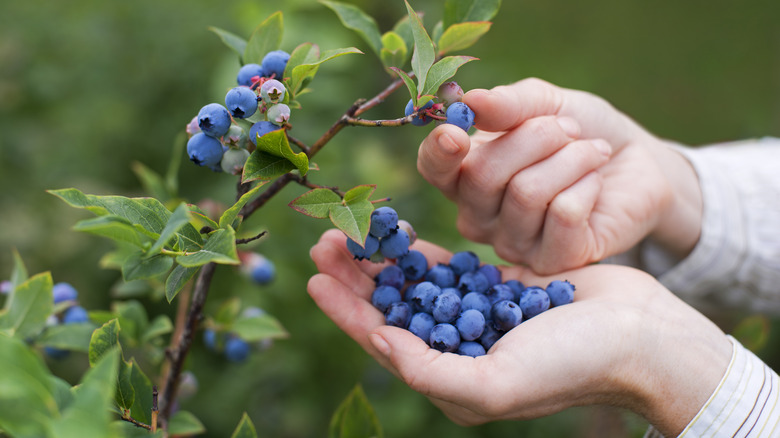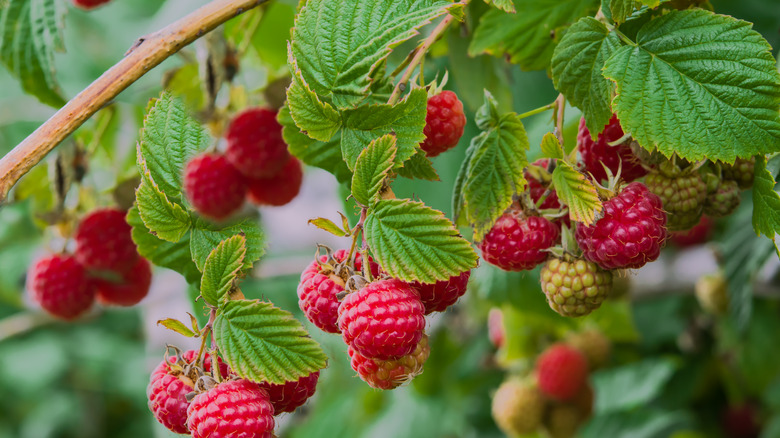Why Blueberries And Raspberries Don't Belong Together In Your Garden
Blueberries and raspberries taste amazing in fresh fruit salads and atop a cheesecake. So, when planning your backyard garden, you may think that growing both plants would be a great way to get more of the antioxidant-packed duo while saving some money on groceries. Unfortunately, in the garden, the two plants don't go well together at all.
There are a few reasons for this, and the first is that blueberries and raspberries grow in different ways. Blueberries grow in small shrub-like bushes while raspberries grow in long thorny canes that can quickly become brambles. Raspberries also spread quickly and can easily take over an entire garden or yard. This means that if planted near each other, the raspberries would likely choke out your blueberry bushes. On top of this, the two plants require different types of soil. Blueberry bushes love acidic soil with a pH of 4.8 to 5.5 while raspberries prefer soil slightly more alkaline at around 6.0. (via HGTV). This means that if both berries are planted together at least one will be in the wrong soil and will suffer.
So, instead of growing these berries together, what should you do? Firstly, you can choose to plant both and put at least one in a pot or above-ground garden bed, or you can choose to grow only one and grow it well. Here's how to do it.
Tips on growing blueberries
While both blueberries and raspberries do require some time and care from gardeners, blueberries have the advantage that they are easier to control as they grow in small manageable bushes instead of thorny brambles. So, if you have never grown berries before, or if you don't have a ton of time to spend staking up raspberry canes, blueberry bushes may be the better choice.
One important thing to know about growing blueberries is that they are not self-pollinating. This means that you will need to have at least two bushes to get fruit. Also, before you put your blueberry bushes in the ground, you will need to test the soil to make sure it is acidic enough. If not, you can add elemental sulfur to your soil to lower the pH, or plant the bushes in pots or a raised garden bed filled with acidic soil from the garden center. Blueberry bushes also have shallow roots and do better when insulated with mulch or peat moss.
While blueberries and raspberries don't grow well together, one berry that does go well with blueberries in the kitchen and the garden is strawberries. In fact, strawberries prefer acidic soil (with a pH as low as 5.3, according to the University of Minnesota) and have similar sun and water requirements as blueberries. Other companion plants for blueberries include thyme, sage, mint, ferns, and rhododendrons.
Tips for growing raspberries
Raspberries are great plants for gardens that are naturally more alkaline and are perfect for gardeners who are willing to put in a little more time and effort for a large harvest. A single adult raspberry bush can produce around one to two quarts of berries and a few bushes are often enough for most gardens.
However, the one important thing to know about raspberries is that they are prolific spreaders. As one Redditor on the homestead forum of the website put it, make sure to "put [raspberries] somewhere that you don't mind them taking over because they will." The best place to grow raspberries is in a line near sturdy support (like a fence or trellis) so that the canes can be easily tied up and kept off the ground. If you want to stop the plants from spreading and taking over, you can always put them in large pots to keep the roots contained.
While raspberries don't necessarily grow well with other berries, they do grow well with other useful and edible plants — especially alliums like garlic, onions, leeks, and chives. They also do well when planted near clover and marigolds.


